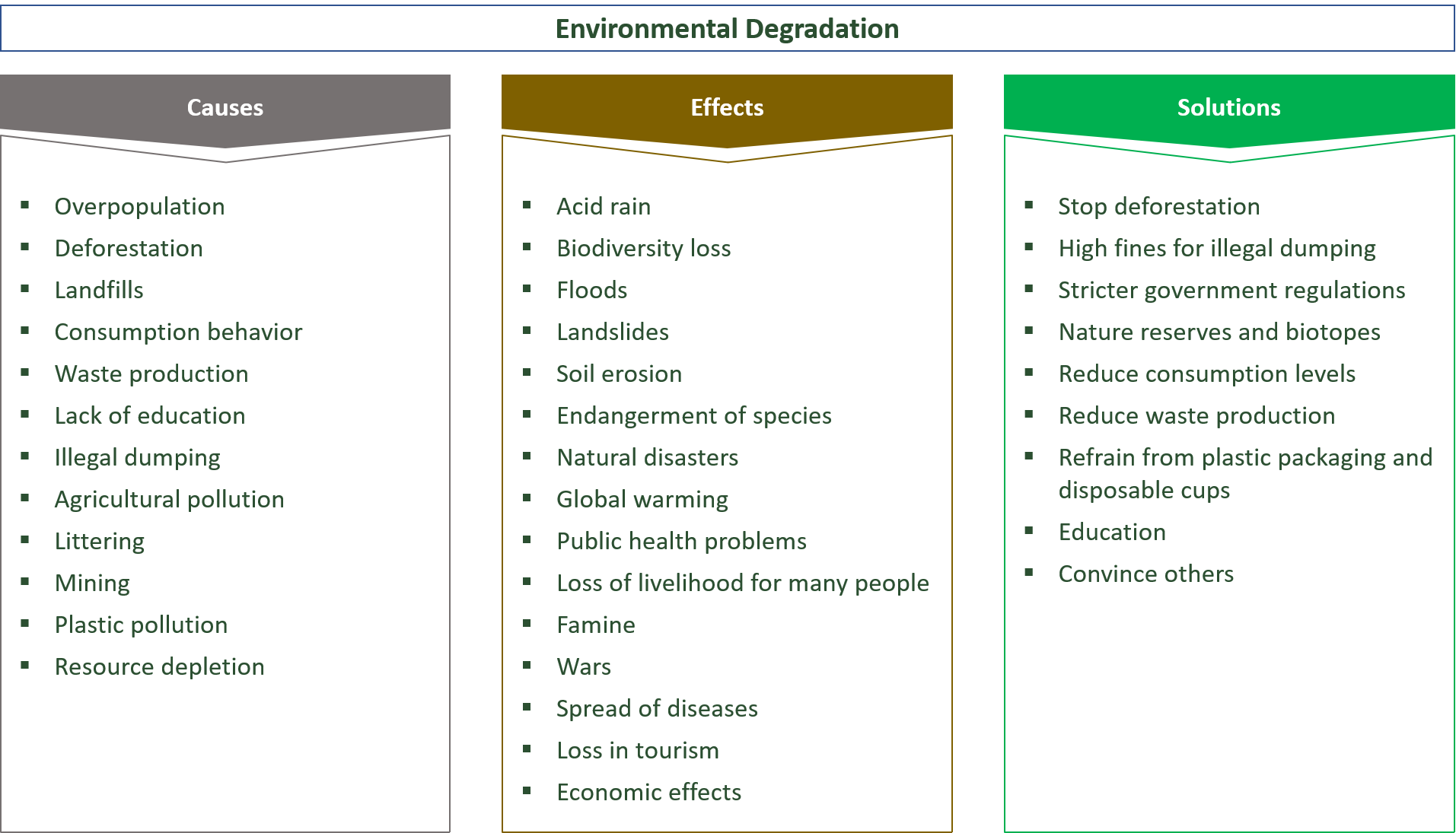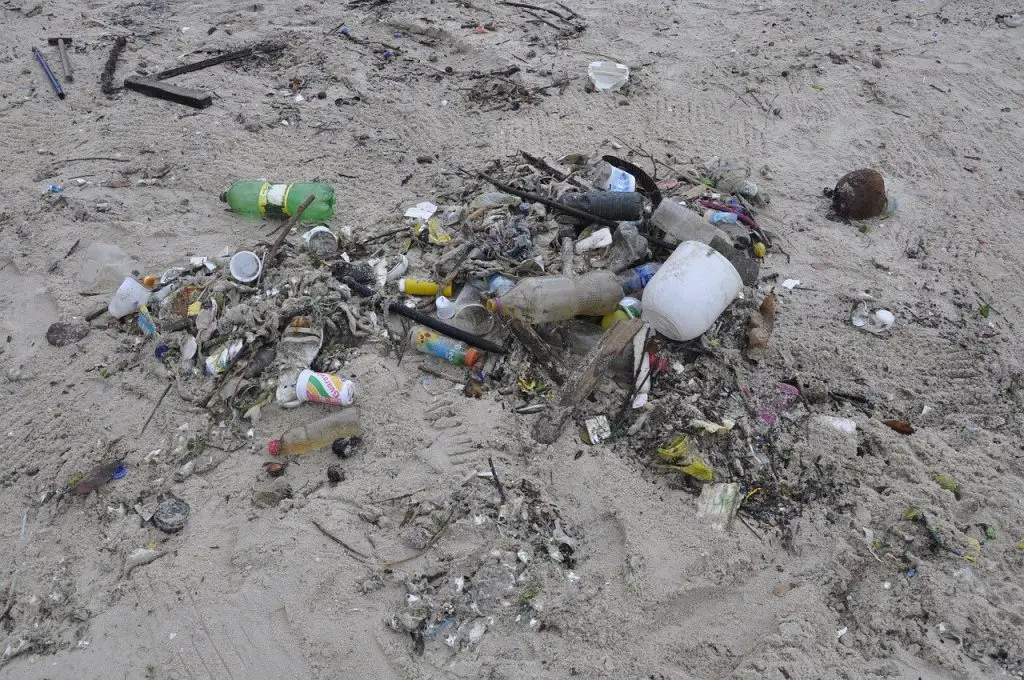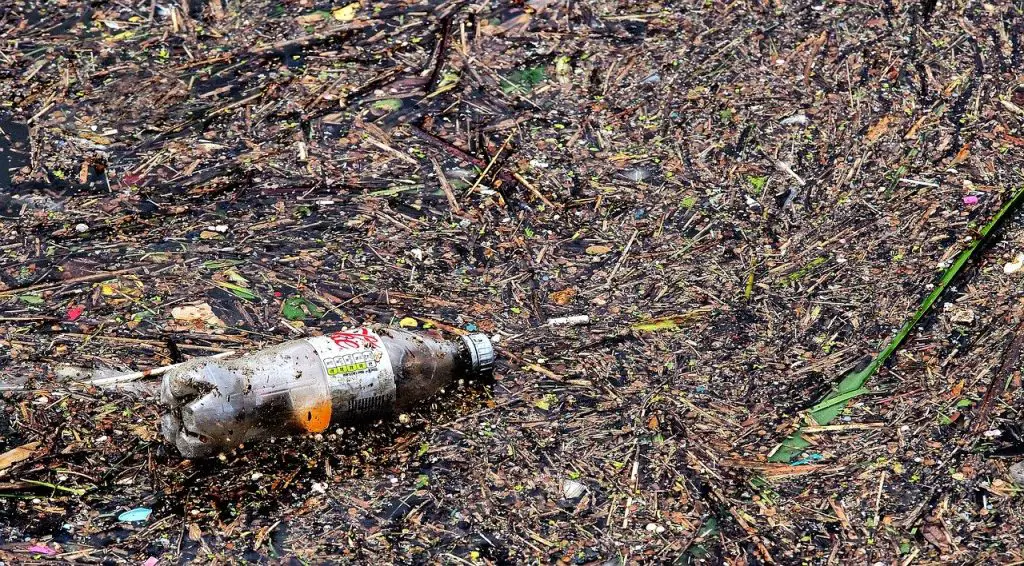“Every creature is better alive than dead, men and moose and pine trees, and he who understands it aright will rather preserve its life than destroy it.”
Henry David Thoreau, Author
Environmental Degradation: Causes, Effects & Solutions

Environmental degradation can be defined as the deterioration of the environmental system due to human intervention.
Ecological degradation can have serious effects on many animals, plants and also for humanity.
Thus, in order to prevent these adverse consequences, we should take several measures in our daily life.
In the following, the types, causes, effects and solutions for environmental degradation are examined.
Audio Lesson
Contents
Types of Environmental Degradation
- Land and soil degradation
- Water degradation
- Atmospheric degradation
- Pollution
Land and soil degradation
The quality of soil is quite important for many plants and microorganisms.
However, due to human intervention, the soil gets polluted to a serious degree.
For example, through farming practices, excessive amounts of fertilizers and pesticides are used.
Pesticides often contain toxic elements that can pollute the soil.
Moreover, many landfills have leaks and trash that contains harmful components can enter the soil and pollute it.
Water degradation
Good water quality is crucial for human life as well as for the life of many animals.
Due to human intervention, our water becomes polluted in several ways.
Trash is often just dumped in our oceans in order to get rid of it.
In many poor countries, illegal dumping is also a big problem.
Large amounts of industrial waste are just disposed of into nearby rivers or lakes, causing tremendous water degradation.
Atmospheric degradation
Atmospheric degradation includes air degradation, particle pollution and also implies the depletion of the ozone layer.
Atmospheric degradation occurs due to our increased consumption levels and the implied increased demand for material goods.
In order to meet the demand for goods, industries have to produce large amounts of items that causes the emission of harmful gases, including greenhouse gases that contribute to the global warming issue.
Moreover, also a significant part of our energy production relies on the combustion of coal, which also leads to severe air contamination.
Several other kinds of pollution
Apart from land, water and atmospheric degradation, there are many other kinds of pollution that are part of environmental degradation.
This includes noise pollution, light pollution and pollutions regarding nuclear waste.
All these kinds of pollution have significant adverse effects on our planet.

Causes for Environmental degradation
- Overpopulation
- Deforestation
- Landfills
- Consumption behavior
- Waste production
- Lack of education
- Illegal dumping
- Agricultural pollution
- Littering
- Mining
- Plastic pollution
- Resource depletion
Overpopulation
Overpopulation is a big problem for our environmental system.
A growing number of people also implies an increasing overall consumption level.
This increasing demand for material goods leads to an increase in the emission of harmful gases which in turn leads to air pollution and also contributes to global warming.
Moreover, overpopulation can also lead to significant air and particle pollution from the use of cars that are run by fossil fuels.
Deforestation
Our trees are natural storage spaces for CO2 and also produce oxygen that is crucial for many life forms on our planet.
Through deforestation, large amounts of harmful greenhouse gases are set free which contributes to global warming.
The problem of deforestation is especially severe in the Amazon Rainforest where large areas of forest are cut or burned down, often intentionally to get more land for farming purposes.
Landfills
Landfills can also lead to environmental degradation if they are not set up properly.
Since the waste disposed into landfills often contains harmful substances, leaks in landfills can lead to significant soil pollution.
In many developing countries where technological progress is not advanced yet, leaks in landfills are quite common which in turn can lead to serious environmental degradation.
Consumption behavior
Our consumption behavior is also a big problem for our planet.
Since we always want to have the newest smartphone, the trendiest clothes and so on, our consumption levels reached a point where it is not sustainable for our environmental system anymore.
Our excessive consumption implies the excessive extraction of precious resources out of the ground, which implies several kinds of environmental degradation.
Moreover, our material goods have to be produced in industrial processes, which leads to the emission of large amounts of harmful gases into our atmosphere.
Waste production
Our excessive consumption behavior also implies the production of enormous amounts of waste.
In order to get rid of this waste, it has to be burned or disposed into landfills.
Moreover, in some countries, waste is also dumped illegally into lakes, rivers or forests, where it can lead to significant water and soil degradation.
Lack of education
Many people are just not aware of how their actions influence the health of our environmental system.
People are often overwhelmed with their own problems and do not have time or energy to think about our planet.
This mix of a lack of education and simple ignorance can cause significant environmental degradation.
Illegal Dumping
Illegal dumping can also cause environmental degradation since it can lead to several kinds of pollution.
For example, by dumping waste into rivers, lakes or the ocean, the water gets polluted to a severe degree which in turn can lead to the contamination of many fishes and other sea animals.
Moreover, trash is also often disposed into forests, where it can contaminate the soil which in turn may also lead to groundwater contamination since rainfalls may wash harmful substances through the soil into the groundwater.
Agricultural pollution
Another cause of environmental degradation is agricultural pollution.
Since in agricultural processes, large amounts of fertilizer and pesticides are used, the soil can become degraded due to harmful components in these substances.
This can lead to soil pollution and may also destroy the fertility of the fields in the long run.
Littering
Littering is quite common in many nowadays societies.
We often see people dispose of their used cigarettes on the ground right where they stand even if a trash bin is just a few meters away.
This can lead to serious environmental degradation since animals may try to eat the used cigarettes and may die due to that.
Additionally, the disposal of used cigarettes in forests is a main cause for wildfires which also leads to significant ecological degradation.
Mining
Mining can lead to serious degradation of the environment since for mining practices, large areas of land have to be used.
This often also includes deforestation in these areas and the related adverse effects.
Thus, natural habitats for many animals and plants may be destroyed due to mining practices.
Plastic pollution
The amount of plastic trash that is produced each year is enormous.
For instance, it is estimated that worldwide, we use around 500 billion disposable plastic cups each year.
You can imagine the amount of waste that is produced! Since plastic often has to be burned in order to get rid of it, this combustion leads to the emission of harmful gases into our atmosphere.
Moreover, part of the plastic trash also ends up in our oceans where it leads to enormous water degradation and to the death of many sea animals.
Resource depletion
Since the total number of people on our planet increases and people strive for higher living standards, in order to meet the supply for material goods, excessive amounts of natural resources have to be extracted out of our earth.
This will eventually lead to the depletion of many natural resources.

Effects of Environmental Degradation
- Acid rain
- Biodiversity loss
- Floods
- Landslides
- Soil erosion
- Endangerment of species
- Natural disasters
- Global warming
- Public health problems
- Loss of livelihood for many people
- Famine
- Conflicts
- Spread of diseases
- Loss in tourism
- Economic effects
Acid rain
Environmental degradation can lead to acid rain.
Through significant amounts of air pollution in industrial processes, components that cause acid rain are also emitted into the air.
Moreover, through the use of deodorants and other daily life items, we further contribute to acid rain on a daily basis.
Biodiversity loss
Environmental degradation can also lead to a loss of biodiversity.
Land and soil degradation can harm many plants.
Since plants are usually quite sensitive to their natural living conditions, the contamination of soil with harmful substances may lead many plants to die off.
Moreover, animals who rely on these plants will also decrease in population.
Additionally, due to deforestation, many animals will lose their natural habitats and the populations of these animals will diminish.
Floods
Due to deforestation, floods are likely to become more common since there are not enough trees left to store the water.
Floods in turn may lead to severe environmental effects, which may affect the local flora and fauna but also humanity.
Landslides
Landslide may also be a cause of environmental degradation.
Landslides are often also connected with deforestation since the roots of trees are holding the soil together.
If the trees are cut or burned down, they cannot hold the soil together anymore and therefore landslides become happen more frequently.
Soil erosion
Soil erosion is another problem caused by ecological degradation.
Soil erosion can either be caused by natural forces like wind or water or can be caused by human behavior like deforestation or the building of dams.
Either way, soil erosion can lead to severe environmental degradation since large areas of land can become useless due to the erosion of soil.
Endangerment of species
Another cause of environmental degradation may be the endangerment or even the extinction of species.
Many animals and plants are quite sensitive to their natural environmental conditions.
Thus, if these conditions are altered due to pollution or deforestation, these animals and plants will decrease in populations.
For animals that only exist in a few areas on our planet, if these areas are hit by environmental degradation, chances are that these animals become endangered or eventually even extinct.
Natural disasters
Natural disasters can also happen more frequently due to human interventions with nature.
For example, due to global warming, air and sea temperature increase which leads to a higher probability for severe storms and floods.
Global warming
The speed of global warming can also be increased due to environmental degradation.
For instance, trees are a natural storage space for greenhouse gases like carbon dioxide.
Through deforestation, the affected areas are now no longer able to store greenhouse gases and will emit them into the atmosphere.
Moreover, through industrial production processes, electricity generation and the daily use of our cars, we further contribute to climate change since most of these processes involve the combustion of fossil fuels which leads to the emission of enormous amounts of greenhouse gases into the atmosphere.
Public health problems
Environmental degradation can also lead to severe public health issues.
In many countries, due to deforestation, mining or other practices caused by human interactions with nature, the probability of floods or other natural disasters will increase over time.
The effects of those natural disasters will be horrible.
Many people will lose their homes and will suffer from quite poor hygienic conditions due to the destruction of important infrastructure.
These conditions support the spread of diseases and may kill many people.
Loss of livelihood for many people
Many people will lose their livelihood and their homes due to the effects of environmental degradation.
For instance, due to global warming, large areas of land will not be suitable for settlement purposes anymore since due to the rising sea levels, these areas will simply get flooded.
Moreover, some areas will also not be suitable for housing purposes anymore since there will be a lack of drinking water.
Without water, farming and other tasks that may ensure the livelihood of people will no longer be possible.
These adverse effects will lead to the migration of large numbers of people since they will have to relocate in order to find a livable future.
Famine
Environmental degradation will also like to significant levels of famine.
Due to global warming, there will be a lack of drinking water. Moreover, several kinds of pollution further decrease the amount of clean.
Since water is crucial for all life on earth, a lack of water will lead to significant levels of famine since people will no longer be able to tilt their fields or grow crops due to water shortage.
Conflicts
Famine and poverty due to environmental degradation also increase the probability of conflicts.
Since people become more frustrated and desperate, they will be more willing to engage in local conflicts in order to ensure their livelihood.
They may also be more willing to participate in radical activities due to their desperation.
Spread of diseases
Natural disasters due to ecological degradation may also increase the probability of the spread of diseases which may result in epidemics or even pandemics.
Natural disasters often cause vast devastation of infrastructure and also quite unhygienic living conditions.
These conditions increase the probability of the spread of diseases and may also lead to the spread of serious health conditions across borders.
Loss in tourism
Many poor countries rely on tourism as their most important source of income.
Due to environmental degradation, this income will decrease or even fully vanish. Imagine a beach that is covered with plastic.
Would you enjoy spending your vacation on this beach? I don’t think so.
Thus, if countries will not able to deal with the vast amounts of waste produced, they may lose many tourists since tourists usually prefer nice clean spots instead of polluted ones to spend their vacation.
Economic effects
Apart from the detrimental effects of environmental degradation on our environment, there are also severe adverse economic effects related to the issue.
Since large areas of land will be no longer be suitable for agricultural or settlement purposes due to rising sea levels and the flooding of these areas, we will lose significant sources of food and income.
Moreover, through several kinds of pollution, humanity will further lose future income prospects.

Solutions for Environmental Degradation
- Stop deforestation
- High fines for illegal dumping
- Stricter government regulations
- Nature reserves and biotopes
- Reduce consumption levels
- Reduce waste production
- Refrain from plastic packaging and disposable cups
- Education
- Convince others
Stop deforestation
In order to mitigate the adverse effects of environmental degradation, it is crucial that we stop or at least reduce the issue of deforestation.
We need our trees to store greenhouse gases and to produce oxygen and cannot afford to cut or burn them down.
Moreover, forests are a natural habitat for many animals and plants which may become endangered if these forests are cut down.
Therefore, stopping deforestation is crucial for our environmental system.
We could further make a positive impact through reforestation or afforestation.
High fines for illegal dumping
There should also be high fines for illegal dumping in order to reduce the adverse ecological consequences.
If there are only low fines, people and industries will continue to dump their trash illegally since they know that even if they get caught, penalties are quite low.
Consequently, raising fines for illegal dumping would increase the incentive to dispose of trash at official waste disposal sites.
Stricter government regulations
Whenever there are problems that lead to significant eco-degradation, governments should intervene and set a framework to kill the incentive for these kinds of behavior.
For instance, this could come in the form that governments set high taxes for activities that harm our planet and support environmentally-friendly behavior with financial subsidies.
By doing so, industries and also private people get a higher incentive to avoid environmental degradation.
Nature reserves and biotopes
Nature reserves and biotopes could also mitigate the problem of environmental degradation.
On the one hand, nature reserves provide a space for our stressed society to rest and reload their batteries.
On the other hand, they provide many animals and plants with a habitat where they can grow in population and therefore avoid the risk to become extinct in the future.
Reduce consumption levels
In order to transit to sustainable environmental behavior, it is crucial that we reduce our consumption levels.
Our Western society always strives for the newest electronics, the newest smartphone, the trendiest clothes and so on.
However, this behavior leads to massive resource depletion and also to excessive waste production. In order to avoid the adverse ecological consequences, we have to lower our consumption levels significantly.
Reduce waste production
We should also try to reduce our waste production.
This can come in the form that you use your items and food more efficiently.
Moreover, when you want to get rid of old but still working things, ask your family or friends if they want to reuse your old stuff.
By doing so, your material things will be used more effectively.
If no one wants to use your old belongings, separate your waste properly in order to ensure efficient recycling.
Refrain from plastic packaging and disposable cups
Plastic waste is a big environmental issue that leads to significant plastic pollution and the adverse consequences for our planet.
In order to save plastic waste, try to avoid buying items that are wrapped or packaged into plastic.
Moreover, refrain from using disposable plastic cups and bring your own much instead which can be reused several times.
Education
In order to mitigate the problem of environmental degradation, it is crucial that we educate people about the adverse environmental consequences of our daily life behavior and how we can improve our ecological footprint.
This education should start early in school since children are usually more eager to learn new things and to change their behavior compared to adults.
These children are more likely to behave environmentally-friendly when they grow up.
Moreover, they might also convince their parents to behave in a more ecologically friendly manner.
Convince others
As we have seen in the previous analysis, you can make a big impact in your daily life to save our environment.
However, you can further enhance your positive impact by convincing other people regarding the importance to save our planet.
You should show them what environmental degradation really means for future generations and how we can prevent these adverse effects by changing small things in our daily life.
Conclusion
Environmental degradation is a serious problem for humanity.
If we continue our consumption and daily life behavior like we did it for the last decades, future generations will suffer from enormous adverse consequences.
Now is the time to fight environmental degradation! Otherwise, you have to explain to your children and your childrens’ children why our earth has become a place with a low overall quality of life instead of a paradise.
Thus, if we all stick together, we can make a significant impact and preserve the precious variety of animals and plants on our planet.
Sources
https://en.wikipedia.org/wiki/Environmental_degradation
http://www.fao.org/3/X5318E/x5318e04.htm

About the author
My name is Andreas and my mission is to educate people of all ages about our environmental problems and how everyone can make a contribution to mitigate these issues.
As I went to university and got my Master’s degree in Economics, I did plenty of research in the field of Development Economics.
After finishing university, I traveled around the world. From this time on, I wanted to make a contribution to ensure a livable future for the next generations in every part of our beautiful planet.
Wanna make a contribution to save our environment? Share it!